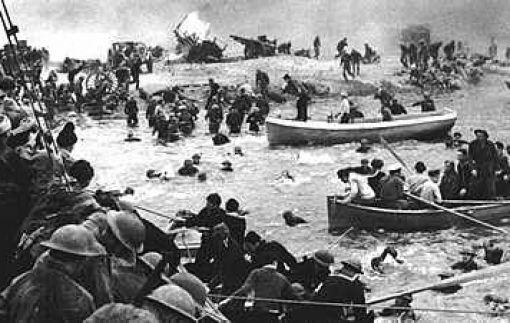He who fights and runs away will live to fight another day.
~ 16th-century proverb, but also attributed to Menander (ca.340-ca.290 B.C.)
 |
The sea from Dunkirk to Dover during those days of the evacuation looked like any coastal road in England on a bank holiday. It was solid with shipping.
~ Sir Douglas Bader (1910-1982)* (attributed)
Dunkirk has fallen ... With it has ended the greatest battle in world history. Soldiers! My confidence in you knew no bounds. You have not disappointed me.
~ Adolf Hitler (1889-1945) (on 5 June 1940)
We shall not flag or fail. We shall go on to the end. We shall fight in France, we shall fight on the seas and oceans, we shall fight with growing confidence and growing in the air, we shall defend our island, whatever the cost may be, we shall fight on the beaches, we shall fight on the landing grounds, we shall fight in the fields and in the streets, we shall fight in the hills; we shall never surrender.
When it was known how many men had been rescued from Dunkirk, a sense of deliverance spread in the island and throughout the Empire. There was a feeling of intense relief, melting almost into triumph. The safe homecoming of a quarter of a million men, the flower of our Army, was a milestone in our pilgrimage through years of defeat.
~Churchill (Their Finest Hour, Ch. 7)
[Hitler's] action preserved the British forces when nothing else could have saved them. By making it possible for them to escape, he enabled them to rally in England, continue the war, and man the coasts to defy the threat of invasion. Thereby, he produced his own ultimate downfall, and Germany's five years later. Acutely aware of the narrowness of the escape, but ignorant of its cause, the British people spoke of "the miracle of Dunkirk."
Between May 26 and June 4, 1940, the evacuation of large elements of the British and French armies from Dunkirk (wiki) on the French coast following their defeat by the German blitzkrieg that overwhelmed France during the early months of World War II took place. The sudden German attack through Belgium on 10 May quickly rolled up the French and British left wing and surrounded it in a small enclave on the English Channel opposite Dover.
In a largely improvised but brilliantly executed maritime operation that mustered both the Royal Navy and civilian small craft of every kind, nearly 340,000 British and French troops - nearly 90 percent of those invested - were ultimately withdrawn, despite incessant German armored and air attacks. (Even now, there is a continuing controversy about whether Hitler - for unknown reasons - ordered the Wehrmacht to hold back from a final attack that would have prevented the withdrawal. See Liddell Hart's quote above.)
Although virtually all of the Allies' weaponry and equipment were abandoned, the men survived to fight again, and just four years later they returned to France on D-day, 6 June 1944, achieving final victory in May 1945. On this same day, in reaction to the success of the Dunkirk evacuation, Winston Churchill delivered his famous "we-shall-fight-on-the-beaches" speech to the House of Commons,but also noted ominously,
"Wars are not won by evacuations."
* N.B. Douglas Bader was an RAF fighter ace in World War II who had lost both his legs in a flying accident but still continued to fly in combat.
If you'd like a quick and basic understanding of this subject (or want to provide one to someone else), this 4 minute wartime British Pathé newsreel about Dunkirk will do the trick:
A movie entitled Dunkirk is due out this summer (July 2017) - here's an extended trailer:
Much more at the BBC's Dunkirk archive.
Much more at the BBC's Dunkirk archive.
The text above is adapted from Ed's Quotation of the Day, only available via email - leave your email address in the comments if you'd like to be added to his list. Ed is the author of Hunters and Killers: Volume 1: Anti-Submarine Warfare from 1776 to 1943 and Hunters and Killers: Volume 2: Anti-Submarine Warfare from 1943.



No comments:
Post a Comment